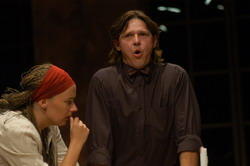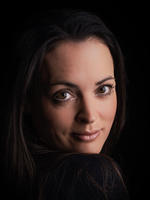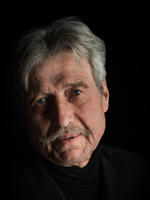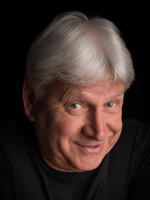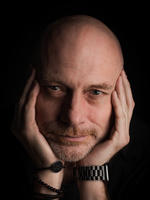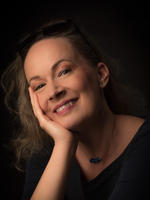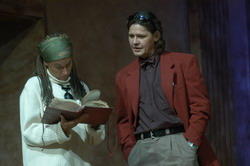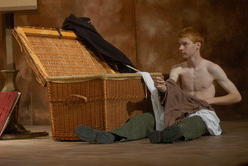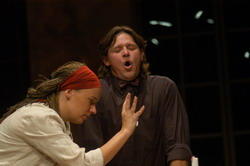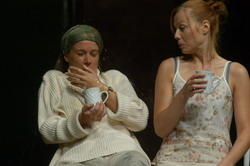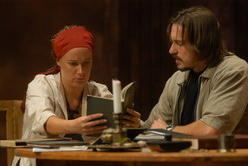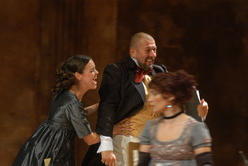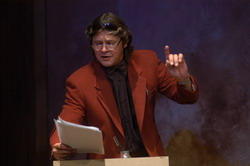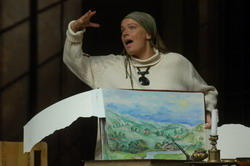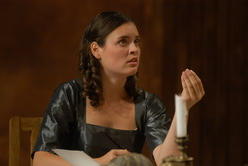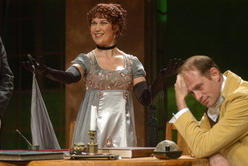Brno Arcadia Does Not Lead to Bliss Directly
Luboš Mareček 19. October 2004 zdroj Divadelní noviny
The Brno Municipal Theatre put on stage the famous Stoppard’s play Arcadia as the second Czech theatre. Its Czech premiere took place with a due pomp in the author’s presence in the Prague Comedy Theatre (Divadlo Komedie) six years ago. The drama written in the year 1993 leads its producers behind the limits of dramaturgic certainty. The multilayer text is not automatically directed to open arms of audiences. Actually, the author himself said at the end of the 1970’s that he is not interested in heroes with capital H and psychology with capital P. What attracts him are ideas and that is why he must create bearers to communicate them. Stoppard admitted later there are ideas for three dramas in Arcadia. And he is right.
The profusion of ironic plays on words, paradoxes or aphorisms is included in a complicated composition of action. What took place in a room is investigated by people two hundred years later in the same room. At the end, the history is interlaced physically with the real time. The figures resolve rather seclusive themes for the majority of people. Whose life passion are integrated algorithms, literary history and park architecture? From this point of view, Stoppard’s play is really paper to a certain extent.
However, the lambent dialogues, exciting investigation in the history, sarcastic remarks on the stiffness of the scholarly academic world and indefiniteness of all its theories make a viviparous dramatic mixture which theatrical consumption need not be an experience just for intellectuals. Stoppard’s intellectual detective story has an innumerable number of meanings including irony, tenderness, comic situations, but also sexuality, love and its destruction. Stoppard’s Arcadia is not only an illusion or a dream bucolic countryside. It is a space where the spirit blessed with the ability to think, combine, discover, contemplate and play is “grazing”. The producers of Stoppard’s play should lead the audience this way.
Arcadia was studied in Brno by the director Roman Polák from Bratislava who does not use pirouettes of surprising actions or other scenic effects which would detract attention from the main thing: dialogues.
In Arcadia, Wildeian art of lambent dialogues is blinking. We do not master them as the English do. To speak with delight, to let words flow cheerfully, to juggle gracefully with their meanings and to stack perfunctorily banal and real wisdom at the same time is not easy. Wilde’s comedy the Importance of Being Earnest put on stage of the Brno Municipal Theatre last year could be understood as a test for Stoppard’s Arcadia. One of its protagonists, Viktor Skála, was excellent in Arcadia. His sarcastic teacher Septimus Hodge is a masterfully written figure and Skála endowed him with temperament a dramatic charm. Irena Konvalinová depicts brilliantly Lady Croom, the amoral protector of good manners. Evelina Jirková playing the role of teenager Thomasina managed convincingly her transformation from a child to a strong-minded girl. The historical group from the year 1809 seems much more lively in the Brno presentation. It is due to the fact that the present level of Arcadia has not so “evil” atmosphere, it is more talkative.
However, the director Polák did not compose a mere fluffy conservation drama in Brno.
Stoppard’s play shows with irony and nostalgia how relative are all theories and the knowledge itself. Polák sprinkled the richly branched scenario with more ticklish moments, trying patiently and slowly to orient the actors and the audience in it. His three hours’ presentation is fortunately neither a popular amusement, nor a boring and static academic presentation, though it loses pace after some time. The final nostalgic tone brings about the question: What is all our endeavour good for? Due to its length and contents, the colossal Brno Arcadia will not be digested without problems by everybody. The Brno Municipal Theatre proved with this choice that they can venture a demanding repertory.
Stoppard’s Arcadia as Timeless Drama
Tomáš Hejzlar 1. October 2004 zdroj Haló noviny
Recently, the Brno Municipal Theatre (MdB) has become well-known in particular for the series of imaginative, mostly original authorial musical projects, but its dramatic production is not negligible either. The company director Stanislav Moša decided for a modern universal theatre which must earn money in the present capitalistic conditions, often tough for the culture, but he does not use methods of truckling repertory.
This is proved by the recent performance of the play Arcadia by the present British author Tom Stoppard coming from Zlín who belongs to the most renowned dramatists of the present time. His best known dramatic titles include the Hamletian paraphrase Rosencrantz and Guildenstern Are Dead, film viewers mainly appreciated his film Shakespeare in Love.
The Brno version respects the functionally felt meeting of imaginary “reality” and experiment and reconstructs it in rather nostalgic, strongly eloquent, almost Chekhovian tone without stage banalities and over-abundant building for the stage of all kinds. Arcadia perfectly unifies subjective psychologization with timeless ideas. Stoppard’s production manifests his personal creative Ahasuerism, maybe influenced by the fact that the dramatist’s family ran away from the Czech territory before the expanding fascist machinery to a distant foreign country before the World War II to save their bare lives. Stoppard’s spatiotemporal thinking defies the limited nationalistic trends: it goes “through times and places” to the timelessness. In Arcadia, Kafkaian intelectual visionariness is reflected, interlaced with Capekian European humanism. But Stoppard goes on: he is a highly contemporary author.
Arcadia can either be understood as a fancy conversation play successfully fulfilling an auditorium, or as a sharply contrapositive, academically depersonalized, almost laboratory essence of philosophical production on the stage. But the director Roman Polák (guest) did not choose any of these two extremes: He tried to find a compromise between attractiveness and the appeal of the theme – and he seems to have found it: although the play exceeds an ordinary time limit of spectatorial attention, the direction attracts attention not by a ticklish particularity, but by the endeavour for a decent professionalism. Thus, the play can look like a real dramatic concert in some moments. But suddenly, comedic frivolousness appears now and then to lighten close attention. The actors seem to feel it very well and try to contribute with their performances to the great arch of realization. They are perfectly equal, without individuals standing out, they understand their level and goal within the whole. Each of them should be mentioned, even in those seemingly peripheral roles. But it is not possible to suppress the unique creation of Alena Antalová: her performance is a sample of singular dramatic qualities we often lack on Prague stages. Her seemingly frigid writer Hannah who will not let her surrounding to do her any harm, is a cheeky emancipated modern woman whose inner feelings are much richer than it seems at first sight. Antalová plays her part with a deep psychological touch, she is neither pathetic, nor shallow.
Thus, the Brno performance of Arcadia is a likeable collective dramatic concert, perfectly knit rhetorically and motorically, but with one stellar figure – depicted by Antalová. The simplified stage design by Jaroslav Milfajt and costumes by Sylva Zimula Hanáková (guest) correspond to the total concept. The dramatic advisers Ladislav Stýblo and Jiří Záviš enriched the repertory of the Brno Municipal Theatre with a topical drama, the ensemble managed its performance with good professional reputation.
When we have found all the mysteries...
23. September 2004 zdroj Scena cz
When we have found all the mysteries
and lost all the meaning, we will be alone,
on an empty shore... (Arcadia)
The Czech premiere of Tom Stoppard’s play Arcadia presented at the Divadlo Komedie (Theatre of Comedy) in 1998 had a favourable reception and was granted the title Play of the Year in the Alfred Radok Award. On these days, its new interpretation (directed by Roman Polák) was presented at the Brno Municipal Theatre.
Arcadia is set in two time frames which alternate in the first half of the play and fuse with one another like two streams, blending together stealthily in the second half of the play. This penetration of the past and the future, reality and fantasy, comedy and tragedy, life and death, love and reason is typical for the majority of Stoppard’s plays. If a director wants to fall in line with this Stoppard’s offer and deliver his words in the most authentic mode, he should not select any bitter interpretation or cross out – as everything has its exactly devised place – and he should submit himself to his elegant conversation (maybe a little à la Oscar Wilde) and bet on the refinement of actors’ performances. The Brno Municipal Theatre seems to have such actors.
Let’s name at least young Thomasina (Evelína Jirková) bearing in herself last touches of childhood with a tragic accent of premature death, teacher Septimus Hodge (Viktor Skála) standing in the background of the events he himself put in motion (unwillingly) and redeeming them with his eremitic life, feministic journalist Hannah (Alena Antalová) disappointed in life, or self-confident professor Nightingale (Martin Havelka).
Brno Rehabilitated Stoppard’s Arcadia
Jiří P. Kříž 7. September 2004 zdroj Právo
One of the two presentations by Sir Tom Stoppard (born in 1937 in Zlín, Czech Republic) that opened a new Czech theatre season on the first September weekend was Arcadia, Stoppard’s most successful play so far, performed in the Brno Municipal Theatre. The other Stoppard’s play, The Real Thing, had its Czech premiere at the Slovácké divadlo (Moravian Slovak Theatre) in Uherské Hradiště.
Arcadia was studied by one of the best Czech theatre companies directed by Roman Polák from Bratislava. In 1999, the presentation of Stoppard’s Arcadia was granted the Alfred Radok Award and the title Play of the Year.
However, the performance put on stage of the Prague Divadlo Komedie (Theatre of Comedy) directed by Robert Russel fell markedly behind the interpretation possibilities of the extensive play as offered by the author as well as the congenial Czech translation by Jaroslav Kořán. There was just a good feeling left that the Czech premiere took place before the Parisian premiere in Comédie Française where Arcadia was the first performance of a living dramatist from a non-francophone area.
Roman Polák returned Arcadia where Stoppard had set it - in two radically different time frames – the present and the end of the first decade of the 19th century. Stoppard’s text is full of masterful mystifications and ironies directed against authorial, scientific, pedagogic and aristocratic estates. He confronts not only the same rate of animality in the scholarly and plebeian worlds, but mainly the simplicity, uncertainty and errors of quasi scholarly assignments suppressing the natural and meaningful solutions of problems. Personal, historical, mathematical...
Sarcasms addressed to human self-conceit
In the historical fiction of the small section of Lord Byron’s stay united with a scandal in the bucolic Arcadian countryside, futurological philosophical contemplation full of period passions of Napoleonic wars and personal duels of the poor rhymester Chater (Jan Mazák) and intellectually and erotically quick-tempered Hodge (Viktor Skála), big Stoppard’s sarcasms gush from Arcadia to the address of morality, intellectual maturity and human self-conceit.
In the explorational effort of our contemporaries looking speculatively for every step of the past personalities like Nightingale (Martin Havelka) or living from the bestseller fame of farraginous stories like Jarvis (Alena Antalová) also our academics living on quotations of quotations successfully for long dozens of years as well as quickly fermented politicians of beer brotherhoods only taking care of their attachment to ruling people and their own medial image can recognize themselves.
Like a market place
According to Stoppard, Arcadia, the mythic territory of bliss and harmony, does not function any better than a market place. Everything in the author’s brilliantly arranged ironic fantasy permeates, first with delays, finally literally, without people enclosed in their epochs and mistakes being able to really meet or perceive each other.
The success of this demanding presentation, one of the most eloquent opuses of the present world playwriting, is also due to the performances of Evelína Jirková and Veronika Poláčková (Thomasina), Irena Konvalinová (Lady Croom), Pavla Ptáčková (Chloe), Petr Štěpán (Valentin), Zdeněk Junák (Noakes) and others. Maybe, this is the way to Stoppard’s largest nine-hour drama The Coast of Utopia written in the year 2002 which is still neglected by Czech theatres.
Arcadia Unknits the Web of Past and Present Relations
Simona Polcarová 7. September 2004 zdroj Rovnost
First of all, Arcadia is a play of thoughts, so the most active beings (the flighty Mrs Chater) do not even appear on stage. The highest attention is devoted to the brilliant conversation about mathematics, literature or garden architecture and it must be said that the actors feel like the fish in water in these fields explaining the respective problems as if it were their daily bread. The fates of the past and present characters complete one another and fuse, being interlinked finally in one scene after several jump cuts in the year 1809 and 1812 and back.
The director was lucky at assigning roles: Viktor Skála as a teacher of young Thomasina Coverly is very sophisticated and pleasant, resembling Wilde’s characters; Petr Štěpán plays the part of Valentin Coverly penetrating the mysteries of mathematics in the present world; Alena Antalová plays the role of authoress Hannah Jarvisová looking for sources for her further work in the Coverlys’ country estate. Hannah impersonated by Alena Antalová is the most mysterious and complicated character standing on principle on the side of reason and resisting any emotion, yet awaking emotions and desires in all her masculine counterparts. Evelína Jirková (alternating with Veronika Poláčková) in the part of unwittingly brilliant and soulful Thomasina is lovely. Dumb Gus Coverly (Pavel Hýža) becomes her parallel. Irena Konvalinová as sneaky Lady Croom does not lose her stripes and Martin Havelka plays with zest another of his self-pleased, conceited rogues in the part of professor Nightingale.
Arcadia is a play where a lot of things is said and a lot of things will be said about. It bears many interpretations and offers an endless number of polemics. And many questions remain unanswered. But who comes to like it, that will fall in love with it in spite of its unusually comprehensive character.
Brno “Dreams” with Four Eyes
Eva Rolečková 30. November 1991 zdroj Lidová demokracie
“…The atmosphere of initial scene is impressive: romantic, mysterious forest with stylized jumbles of branches and roots where mysterious beings in impressive masks come up from the fog. In the craze of night, hate alters with fugacious loves and an ephemeral dream of harmony is floating above. A single spoken word is not pronounced in the whole musical, the stage expresses itself by singing, movement, light; it is a picture with musical background. Spectator’s perception is attacked very aggressively and – as it is evident from reactions of the audience – this aggressivity is welcome …”
A Set Mirror
Jaromíra Trunečková 29. November 1991 zdroj Haló noviny
“… In all respects, it is a remarkable performance … All performers dispose of good singing and moving abilities …
…The up-to-date musical with its allegories sets a mirror to the days we live, to reverse values, purpose aiming of truth and lie, love and hate. In one of the most impressive songs something like a credo of humankind is expressed: My world,/how great you are,/you have been / and you will be eternal;/ and even if you were disgusting / you are unique for me.”
Czech Musical at Last
va 1. December -1
“…The force of the “Dreams” lies not only in the harmony of all components, but also in a characteristic Slavonic melodiousness. With a silent approval of William Shakespeare, the libretto was written by Stanislav Moša, director of the Brno Municipal Theatre who entrusted Zdeněk Merta to set the text to music. And it seems he did not do badly there. Merta’s melody and the way of processing a model, revealing the author’s relation to serious music, formed by the study of the Academy of Music Arts, and to popular music, work in the whole context as a pleasant and binding element …”
-
Dreams at the Fountain
Jaroslava Suchomelová 1. December -1 zdroj Svobodné slovo
“…Midsummer Nights’ Dreams is “a musical of a single song”, but the song is worth every minute. When Zora Jandová sings charmingly “…I am you and you are me…” it seems the audience has completely amalgamated with the interpreter. The applause of about one thousand seven hundred spectators who appeared at the fountain on the first Friday in July was long. It appreciated the evident hard work of actors during the ninety-minute performance and also proved that the spectators got what they had expected: rest, amusement and maybe, walking along their own dreams …”
Tradition of Midsummer Nights
Anna Vejvodová 1. December -1 zdroj Telegraf
“A year has run like water and we are very pleased to say that the Midsummer Nights’ Dreams started its second year with its restored first night at 10 p.m. yesterday after last year’s success on the Prague exhibition ground in co-operation with the Křižík’s Fountain …
…The performance is extremely recommended not only to everybody who has not seen it yet or has only seen it once (it is said two views are necessary – close and from distance), but also to the partners who are out: a joint visit of the performance welds married couples as well as lovers …”
Jealousy Surviving for Ages
Libuše Zbořilová 1. December -1 zdroj Rovnost
“The first night of Amadeus in the Brno Municipal Theatre was accompanied with a long-running applause… The programme of the Municipal Theatre is built on musical performances, that is why a key to the new presentation of Amadeus was looked for by the creative team in the preferment of the musical part which was in fact prescribed behind the scene by Shaffer … The presentation of the dramatically worked out play (Jiří Záviš) will also attract an audience so far not very interested in the classical music.”
Černín’s Amadeus Became a Peak of the Season
Simona Polcarová 1. December -1 zdroj Brněnský den
“The last premiere of this season was introduced by the Brno Municipal Theatre at the weekend. It fascinated not only with its starry title – Amadeus, a drama by Peter Shaffer, but also with its impressive presentation …
… Zdeněk Černín managed a tour de force at the end of the season. If he decides to devote the mise-en-scene to the deceased director Petr Hradil in case of its success, he may do so without hesitation.”
Shakespeare as a Pretence
Jaromír Malý 1. December -1
“…The principal programme is rhythm, order, feeling. The melodies are kind, lovely, unconventional. They may be compared to Gershwin’s Porgy and Bess. There are the motifs of Slavonic sensitivity in a wide range from the classics up to Janáček and Ježek. The songs “I Am You and You Are Me” or “My World How Great You Are” may soon become popular.
The dramatic and music performances are in a precious harmony with the other components influencing an audience. However, the fairy-like, magic vote of Zora Jandová rises high above the balance…
The direction attacks an audience with words, songs, motion, music, dance, humour, and colours. That is why, it is not possible to make an interval. You will be sitting for 90 minutes as transfixed to your seats and even after that you will not want to leave!…”
Dreams Brought from Brno
Miroslav Mokoš 1. December -1 zdroj Svobodné slovo
“Those who did not hesitate and went to the KÁ Theatre on Friday or Saturday to see an unusual guest performance of the Brno Municipal Theatre, surely did not regret…
…The musical fairy tale Midsummer Nights’ Dreams written by the director Stanislav Moša and the composer Zdeněk Merta after William Shakespeare’s play attracted the audience not only with its unusual direction, but also its imaginative scenic decor and remarkable performances of all actors. They managed to create an impressive show pleasing to the eyes and ears…
… The audience was given what it expected from the current theatre, i.e. the possibility of forgetting common troubles for a while and losing itself in dreams. Not only in those of the Midsummer Night.”
A Beautifully Coloured Accord
jjv 1. December -1 zdroj Květy
“It does not happen very often a single seat is not free, chairs from the backstage are moved to the auditorium and a lot of spectators stand in the aisles – The Brno Municipal Theatre giving a guest performance managed this tour de force in Prague. Since the Brno first night, the performance entitled Midsummer Nights’ Dreams had been preceded by a very good reputation and it should be said by way of introduction that the guest performances in Prague intensified its credit…
…Merta’s music is creative and does not forget of the melody with which a spectator wants to leave the theatre. In short, the Midsummer Nights’ Dreams is a kind of performance bringing back the faith in the present and mainly in the future of our theatre.”
The Dreams Arousing Admiration
I. P. 1. December -1 zdroj Gramorevue
“…Merta wrote a lot of brisk, clever and catching music, the ensemble of the Brno Municipal Theatre overcame itself and studied difficult parts in a way arousing admiration …
…The atmosphere is intensified with an imaginative stage setting which mediates an impression of harmony of human beings with the nature and with a choreography which is not aimed at dances but an expressive movement of which stage characters are born. And if the dramatic performances are so good and expressive (the author of libretto, Stanislav Moša is a director at the same time), then it is clear that the performance is good, even superb …
…Merta is a melodist, which is rare today. And he can make such music that listeners’ fingers, hands and legs start to play. He can also write the music which respects the principle of contrast – in short, you are not bored …”
There Was a Surprise
Jiří Kratochvíl 1. December -1 zdroj Mladá fronta
“…The libretto succeeded. The text is harmonic, melic, the handwriting is of balanced structure …
…I am bowing to Zdeněk Merta. Nothing more but music is alpha and omega of musical – and undoubtedly, it is the strongest element of the performance … It is direct, but not cheap, always in the front, running naturally. As if you have known it, the music is pervading you, you are discovering it and the music seems new to you. With each scene it gets deeper and deeper under your skin… You will also be enchanted with luscious harmony and melody as well … Merta’s music feeds you with every bar, it is as synthetic as the whole show is …
…The performance of the whole Brno ensemble is rarely even, they all are in fact good actors, singers and dancers. A Czech musical was born. And it is worth seeing..”
Dreams under the Fountain
Jan J. Vaněk 1. December -1 zdroj Signál
“…The first Prague performance of Midsummer Nights’ Dreams at the Křižík’s Fountain attracted a lot of spectators who asked themselves: the musical itself is excellent as well as the fountain. Will the two artefacts count up in a new artistic experience a degree higher or will their connection just create a fair and touristic attraction? Well, the former is true: The Dreams acquired even higher emotional force at the fountain, the message brought to an audience is clearer and more lucid.
A long applause at the end of the ninety-minute performance (played without a break and in torrential speed) proved the enthusiasm provoked by the play: the actors had to add. Brno taught Prague a lesson how to make a musical …”
Superb Goblins at the Křižík’s Fountain
(cg) 1. December -1 zdroj Rudé právo
“The clock strikes ten p.m., music sounds. The Křižík’s Fountain starts pouring out the first geysers of water and goblins are coming out of the underground. Midsummer Nights’ Dreams, musical after William Shakespeare’s play, start on the Prague exhibition ground. A story about malice, envy, jealousy, a story about coexistence of a man, a woman and a child each of them wants to usurp, a story of little mannikins – but it is also about us. A unique project was born which connects a theatrical musical form with the choreography of splashing pipes of the Křižík’s Fountain.
The actors of the Brno Municipal Theatre present splendid performances. They dance, sing, return to a confined space under the stage to come back again slowly and lightly and continue their story. Their masks make up fairy-tale magic. Each of them is admirable …”
Disclosed Secrets of Arcadia
Jaroslav Parma 1. December -1
The sixtieth season of the Brno Municipal Theatre was opened by premieres (September 4 and 5) of Arcadia by the English dramatist Tom Stoppard who was born at Zlín. The autor starts playing a very interesting story in which events almost two hundred years old interlace with the present ones. It could be said, Stoppard created a peculiar detective story in which contemporary persons try to disclose events which took place many years ago on the basis of found out circumstantial evidences. The heroes are engaged in the drama not only as “detectives” or actors at the beginning of the events, but he also lets them think, contemplate of things which could occur and of matters concerning the universe.
The story of Arcadia situated in a country house had its premiere in the Royal National Theatre on 13th April 1993 and the play was granted the prestigious Olivier Award for the best performance and dramatic deed of the year 1993. Tom Stoppard is, among other things, a co-author of scenario of the successful film “Shakespeare in Love”.
The Brno presentation, which dramatic advisers were Ladislav Stýblo and Jiří Záviš, is directed by the director Roman Polák (guest, well-known in Brno from the preceding drama Peer Gynt put on the same stage or his work in the Mahen Theatre), who invited the stage designer Jaroslav Milfajta, the costume designer Sylva Zimula Hanáková and the choreographer Vladimír Kloubek to cooperate with him as guests. Music was prepared by Ondřej Šarek.
Arcadia really provides good dramatic opportunities grasped successfully by all actors (pre-premiere on September 3): Veronika Poláčková (alternating with Evelína Jirková), Viktor Skála, Irena Konvalinová, Alena Antalová, Pavla Ptáčková, Martin Havelka, Petr Štěpán, Josef Jurásek, Zdeněk Junák, Igor Ondříček. The young guests Pavel Hýža and Lukáš Kantor (alternating with M. Beran) did well too.
The entrance in the significant season which will be underlined by opening of the Contemporary Music Scene at the beginning of October turned out well. Arcadia will amuse but will also force to think about whether we do not speculate too much on simple things looking for something what has not happened.

